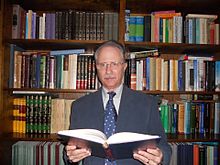Peter Benjamin Golden: Perbedaan antara revisi
Tidak ada ringkasan suntingan Tag: Pengembalian manual |
k PL |
||
| Baris 77: | Baris 77: | ||
{{reflist}} |
{{reflist}} |
||
== |
== Pranala luar == |
||
*[https://web.archive.org/web/20110514055453/http://andromeda.rutgers.edu/~history/index.php?content=deptmem&name=golden Rutgers faculty website] |
*[https://web.archive.org/web/20110514055453/http://andromeda.rutgers.edu/~history/index.php?content=deptmem&name=golden Rutgers faculty website] |
||
*[https://web.archive.org/web/20070708094912/http://mideast.rutgers.edu/FACULTY/BIOS/CV/CV-Golden.pdf Curriculum vitae] |
*[https://web.archive.org/web/20070708094912/http://mideast.rutgers.edu/FACULTY/BIOS/CV/CV-Golden.pdf Curriculum vitae] |
||
Revisi terkini sejak 22 Mei 2024 07.36
| Peter B. Golden | |
|---|---|
 Golden pada tahun 2015 | |
| Lahir | 1941 (umur 82–83) |
| Pekerjaan | Profesor |
| Latar belakang akademis | |
| Pendidikan | |
| Alma mater | Universitas Columbia |
| Karya akademis | |
| Lembaga | Universitas Rutgers |
| Minat utama | |
Peter Benjamin Golden (lahir 1941) adalah profesor emeritus Amerika dari Sejarah, Studi Turki dan Timur Tengah di Universitas Rutgers. Dia telah menulis banyak buku dan artikel tentang Turkik dan Studi Asia Tengah, seperti An introduction to the history of the Turkic peoples.[1]
Golden dibesarkan di New York dan bersekolah di Sekolah Menengah Musik & Seni (New York). Ia lulus dari CUNY Queens College pada tahun 1963, sebelum memperoleh gelar M.A. dan Ph.D. dalam Sejarah dari Universitas Columbia masing-masing pada tahun 1968 dan 1970. Golden juga belajar di Dil ve Tarih – Coğrafya Fakültesi (Sekolah Bahasa dan Sejarah – Geografi) di Ankara (1967–1968). Ia mengajar di Universitas Rutgers dari tahun 1969 hingga pensiun pada tahun 2012. Ia adalah Direktur Program Studi Timur Tengah (2008–2011) di Rutgers. Ia adalah anggota kehormatan dari Türk Dil Kurumu dan Lembaga Kőrösi Csoma dari Orientalis Hongaria dan merupakan anggota Sekolah Studi Sejarah di Institut Studi Lanjutan (Princeton) 2005–2006. Pada tahun 2019, ia terpilih sebagai Anggota Kehormatan Akademi Ilmu Pengetahuan Hungaria.
Karya
[sunting | sunting sumber]- (1980) Khazar studies: An Historico-philological Inquiry into the Origins of the Khazars, Budapest: Akadémiai Kiadó.
- (1992) An introduction to the history of the Turkic peoples: Ethnogenesis and state-formation in medieval and early modern Eurasia and the Middle East, Wiesbaden: Harrassowitz Verlag.[2]
- (1998) Nomads and sedentary societies in medieval Eurasia, Washington, D.C.: American Historical Association.
- (2000) The King's Dictionary. The Rasulid Hexaglot: Fourteenth Century Vocabularies in Arabic, Persian, Turkic, Greek, Armenian and Mongol, Leiden: Brill Publishers (book, edited, Vol. 4 in the series Handbuch der Orientalistik, 8. Abteilung Zentralasien).[3]
- (2003) Nomads and their Neighbours in the Russian Steppe. Turks, Khazars and Qipchaqs, Aldershot, UK: Ashgate Publishing.[4]
- Golden, Peter (2005). Хазары, евреи и славяне [Khazar, Yahudi dan Budak] (dalam bahasa Rusia). Jerusalem dan Moskwa: Gesharim. ISBN 5-93273-196-6.
- (2007) The World of the Khazars: New Perspectives, diedit bersama dengan H. Ben-Shammai dan A. Róna-Tas. Leiden: Brill Publishers.[5]
- (2009) The Cambridge History of Inner Asia: The Chinggisid Age, diedit bersama dengan N. Di Cosmo, A.J. Frank, Cambridge: Cambridge University Press.[6]
- (2010) Turks and Khazars: Origins, Institutions, and Interactions in Pre-Mongol Eurasia, Aldershot, UK: Ashgate Publishing.[7]
- (2011) Studies on the Peoples and Cultures of the Eurasian Steppes, Bucharest–Brăila: Editura Academiei Române – Muzeul Brăilei Editura Istros.
- (2011) Central Asia in World History, Oxford–New York: Oxford University Press.[8]
Kumpulan artikel
[sunting | sunting sumber]- Osman Karatay, István Zimonyi, ed. (2016). Central Eurasia in the Middle Ages: Studies in Honor of Peter B. Golden. Harrassowitz. ISBN 978-3-447-10534-7.
Referensi
[sunting | sunting sumber]- ^ Atwood, Christopher P. "Osman Karatay and István Zimonyi, eds., Central Eurasia in the Middle Ages: Studies in Honor of Peter B. Golden. (Turcologia 104.)". Speculum. 92 (3).
- ^ Sinor, Denis (1995). "Review". Journal of Asian History. 29 (1): 87–89. JSTOR 41930977.
- ^ Strohmeyer, Virgil (2002). "Reviewed Work: The King's Dictionary: The Rasulid Hexaglot: Fourteenth Century Vocabularies in Arabic, Persian, Turkic, Greek, Armenian and Mongol by Tibor Halasi-Kun, Peter B. Golden, Louis Legeti, Edmond Schütz". Iran & the Caucasus. 6 (1/2): 273–275. JSTOR 4030727.
- ^ Di Cosmo, Nicola (2004). "Reviewed Work: Nomads and Their Neighbours in the Russian Steppe by Peter B. Golden". Central Asiatic Journal. 48 (1): 142–144. JSTOR 41928346.
- ^ Makó, Gergő (December 2009). "P. B. Golden, H. Ben-Shammai, A. Róna-Tas (eds): The World of the Khazars. New Perspectives Selected Papers from the Jerusalem 1999 International Khazar Colloquium hosted by the Ben Zvi Institute". Acta Orientalia Academiae Scientiarum Hungaricae. 62 (4): 469–473. JSTOR 23658992.
- ^ Morgan, D. O. (2010). "Reviewed Work: The Cambridge History of Inner Asia. The Chinggisid Age by NICOLA DI COSMO, ALLEN J. FRANK, PETER GOLDEN". Bulletin of the School of Oriental and African Studies, University of London. 73 (2): 330–332. doi:10.1017/s0041977x10000236. JSTOR 25703038.
- ^ Jackson, Peter (22 February 2012). "Peter B. Golden: Turks and Khazars: Origins, Institutions, and Interactions in Pre-Mongol Eurasia". Bulletin of the School of Oriental and African Studies. 75 (1): 189–190. doi:10.1017/S0041977X11001091.
- ^ Jackson, Peter (2012). "Reviewed Work: Central Asia in World History. (The New Oxford World History.) by PETER B. GOLDEN". Bulletin of the School of Oriental and African Studies. 75 (1): 187–188. doi:10.1017/s0041977x1100108x. JSTOR 23258921.
